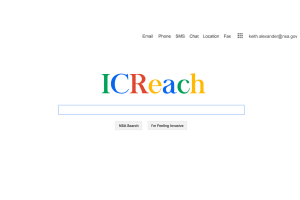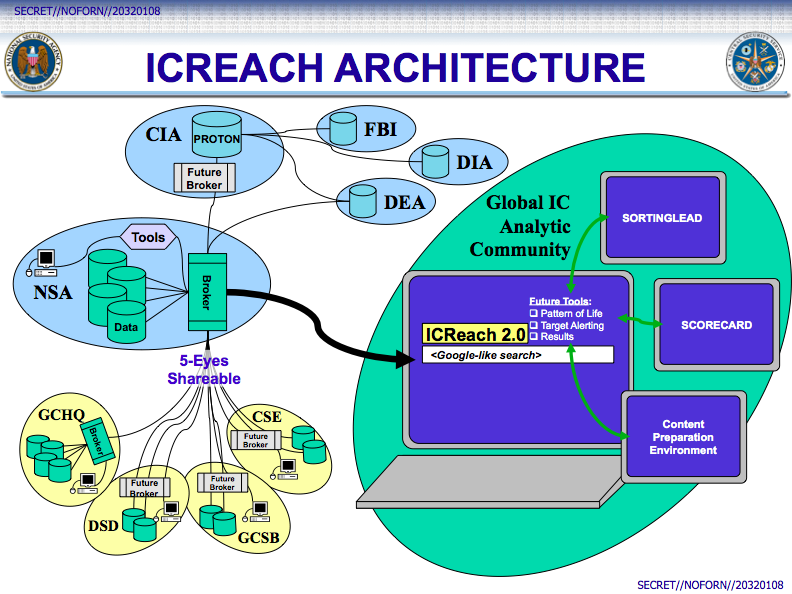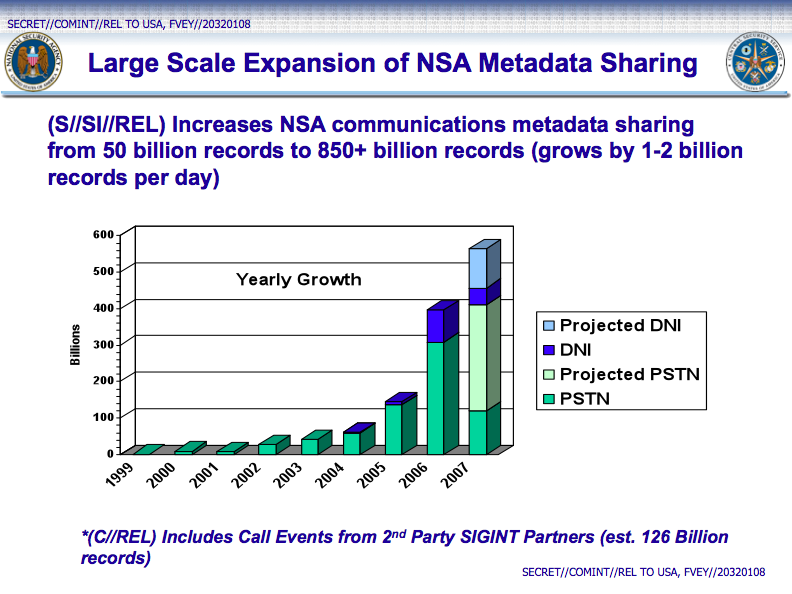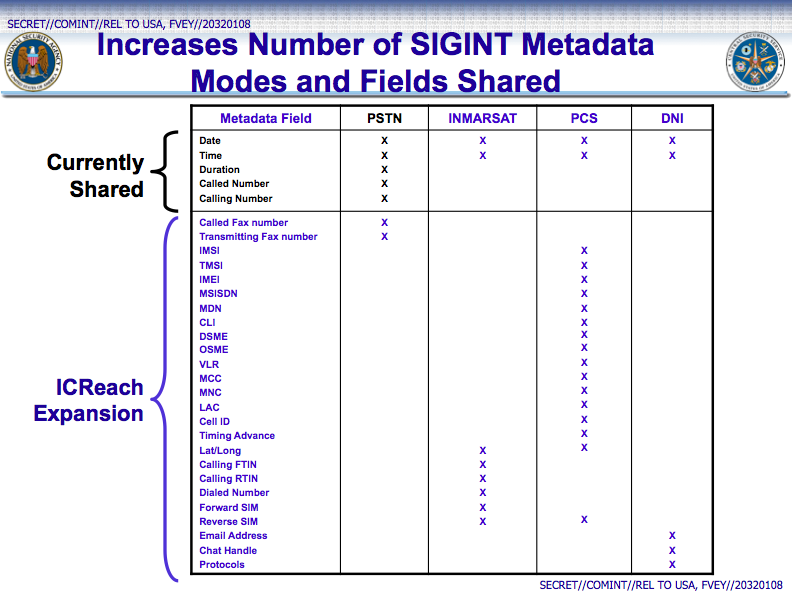How the NSA built its own secret Google
The National Security Agency is secretly providing data to nearly two dozen U.S. government agencies with a “Google-like” search engine built to share more than 850 billion records about phone calls, emails, cellphone locations and internet chats.
 The documents provide the first definitive evidence that the NSA has for years made massive amounts of surveillance data directly accessible to domestic law enforcement agencies. Planning documents for ICREACH, as the search engine is called, cite the Federal Bureau of Investigation and the Drug Enforcement Administration as key participants.
The documents provide the first definitive evidence that the NSA has for years made massive amounts of surveillance data directly accessible to domestic law enforcement agencies. Planning documents for ICREACH, as the search engine is called, cite the Federal Bureau of Investigation and the Drug Enforcement Administration as key participants.
ICREACH contains information on the private communications of foreigners and, it appears, millions of records on American citizens who have not been accused of any wrongdoing. Details about its existence are contained in the archive of materials provided to The Intercept by NSA whistleblower Edward Snowden.
Earlier revelations sourced to the Snowden documents have exposed a multitude of NSA programs for collecting large volumes of communications. The NSA has acknowledged that it shares some of its collected data with domestic agencies like the FBI, but details about the method and scope of its sharing have remained shrouded in secrecy.

ICREACH has been accessible to more than 1,000 analysts at 23 U.S. government agencies that perform intelligence work, according to a 2010 memo. A planning document from 2007 lists the DEA, FBI, Central Intelligence Agency, and the Defense Intelligence Agency as core members. Information shared through ICREACH can be used to track people’s movements, map out their networks of associates, help predict future actions, and potentially reveal religious affiliations or political beliefs.
The creation of ICREACH represented a landmark moment in the history of classified U.S. government surveillance, according to the NSA documents.
“The ICREACH team delivered the first-ever wholesale sharing of communications metadata within the U.S. Intelligence Community,” noted a top-secret memo dated December 2007. “This team began over two years ago with a basic concept compelled by the IC’s increasing need for communications metadata and NSA’s ability to collect, process and store vast amounts of communications metadata related to worldwide intelligence targets.”
The search tool was designed to be the largest system for internally sharing secret surveillance records in the United States, capable of handling two to five billion new records every day, including more than 30 different kinds of metadata on emails, phone calls, faxes, internet chats, and text messages, as well as location information collected from cellphones. Metadata reveals information about a communication—such as the “to” and “from” parts of an email, and the time and date it was sent, or the phone numbers someone called and when they called—but not the content of the message or audio of the call.
ICREACH does not appear to have a direct relationship to the large NSA database, previously reported by The Guardian, that stores information on millions of ordinary Americans’ phone calls under Section 215 of the Patriot Act. Unlike the 215 database, which is accessible to a small number of NSA employees and can be searched only in terrorism-related investigations, ICREACH grants access to a vast pool of data that can be mined by analysts from across the intelligence community for “foreign intelligence”—a vague term that is far broader than counterterrorism.

Data available through ICREACH appears to be primarily derived from surveillance of foreigners’ communications, and planning documents show that it draws on a variety of different sources of data maintained by the NSA. Though one 2010 internal paper clearly calls it “the ICREACH database,” a U.S. official familiar with the system disputed that, telling The Intercept that while “it enables the sharing of certain foreign intelligence metadata,” ICREACH is “not a repository [and] does not store events or records.” Instead, it appears to provide analysts with the ability to perform a one-stop search of information from a wide variety of separate databases.
In a statement to The Intercept, the Office of the Director of National Intelligence confirmed that the system shares data that is swept up by programs authorized under Executive Order 12333, a controversial Reagan-era presidential directive that underpins several NSA bulk surveillance operations that monitor communications overseas. The 12333 surveillance takes place with no court oversight and has received minimal Congressional scrutiny because it is targeted at foreign, not domestic, communication networks. But the broad scale of 12333 surveillance means that some Americans’ communications get caught in the dragnet as they transit international cables or satellites—and documents contained in the Snowden archive indicate that ICREACH taps into some of that data.
Legal experts told The Intercept they were shocked to learn about the scale of the ICREACH system and are concerned that law enforcement authorities might use it for domestic investigations that are not related to terrorism.

“To me, this is extremely troublesome,” said Elizabeth Goitein, co-director of the Liberty and National Security Program at the New York University School of Law’s Brennan Center for Justice. “The myth that metadata is just a bunch of numbers and is not as revealing as actual communications content was exploded long ago—this is a trove of incredibly sensitive information.”
Brian Owsley, a federal magistrate judge between 2005 and 2013, said he was alarmed that traditional law enforcement agencies such as the FBI and the DEA were among those with access to the NSA’s surveillance troves.
“This is not something that I think the government should be doing,” said Owsley, an assistant professor of law at Indiana Tech Law School. “Perhaps if information is useful in a specific case, they can get judicial authority to provide it to another agency. But there shouldn’t be this buddy-buddy system back-and-forth.”
Jeffrey Anchukaitis, an ODNI spokesman, declined to comment on a series of questions from The Intercept about the size and scope of ICREACH, but said that sharing information had become “a pillar of the post-9/11 intelligence community” as part of an effort to prevent valuable intelligence from being “stove-piped in any single office or agency.”
Using ICREACH to query the surveillance data, “analysts can develop vital intelligence leads without requiring access to raw intelligence collected by other IC [Intelligence Community] agencies,” Anchukaitis said. “In the case of NSA, access to raw signals intelligence is strictly limited to those with the training and authority to handle it appropriately. The highest priority of the intelligence community is to work within the constraints of law to collect, analyze and understand information related to potential threats to our national security.”
Axarhöfði 14,
110 Reykjavik, Iceland














